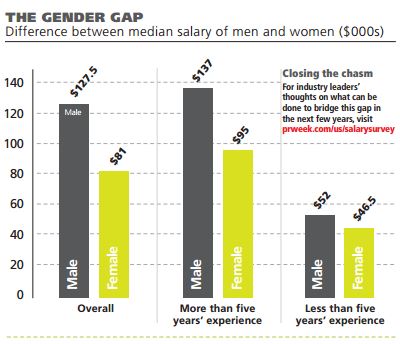New Research Just Revealed Disturbing Pay Gap in the Public Relations Industry

By:
It's no secret that male-dominated tech companies can be uninviting to women, but even female-dominated public relations might have a pay gap problem. Results from the 2015 Salary Survey from PRWeek/Bloom, Gross & Associates show the income gap between male and female earners is $46,500 overall, and guess who brings home the bigger paychecks? For male and female workers with under five years of experience, men take home $5,500 more annually, and the gap increases to $42,000 per year for people with 5+ years of experience in the field.
To compile this data, PRWeek/Bloom, Gross & Associates surveyed more than 1,000 PR professionals, 65 percent of which were female. There is one legitimate caveat to this data: the median age for male responders was 43 compared to 35 for women, so it's possible that the men surveyed were considered more senior and therefore compensated at a higher rate. Regardless, the experience levels measured were the same, so the discrepancies appear that much more problematic. Women are also less likely to negotiate their salaries due to the social costs of advocating for themselves, so that could be another reason men are earning higher paychecks in this industry, among others.
H/T 2015 Salary Survey
What women in PR have to say about this.
Understandably, the survey findings have rattled some women in the industry. Gini Dietrich, CEO of Chicago's marketing communications firm Arment Dietrich, Inc., told ATTN: that this widespread problem is one she'd like to fix.
"Not only do [women] make less, the leadership at the majority of the large PR firms are all male," Dietrich told ATTN:. "I’m doing my part by building an organization that appreciates diversity, pays equally, and promotes women to leadership roles (our director of operations is female) when appropriate."
Dietrich says she has experienced gender discrimination.
"As a business owner, there are two cases that I run into this: Clients never want to pay us the same amount they would a male-run firm (yes, still today)," Dietrick said. "[A]nd though I demand the same speaking fee as my male counterparts, I often have to walk away from opportunities because the event organizers won’t pay it (only to discover they’ve hired a man for the same engagement and paid them what I requested…or more)."
When she started her company a decade ago, she added on a male partner, Charles Arment, to acquire new business. "It didn’t last very long because we were able to prove our abilities and then have clients to give references, but I definitely needed the perception of having a man running [the] joint to get the business launched," Dietrich said.
Rachel Kay, president of Rachel Kay PR (RKPR), echoed a similar sentiment.
"The data is troubling, but likely not surprising to anyone who’s spent any time in the industry," Kay told ATTN:. "It’s up to senior level management to commit to equality and reward for skill and contribution rather than gender. In addition, we need to embrace the fact that we have a unique industry that skews significantly female, rather than use that as an excuse to abuse the very demographic that helps us thrive."
Kay hopes that young people can work to boost the salaries of women in PR.
"I have a lot of faith that the Millennial generation will play an important role in changing this trend, as they are often more assertive about asking for what they need and what they want and seek out new opportunities if they aren’t being rewarded the way they feel they should be," Kay said.
The pay gap is troubling, but Heather Whaling, CEO and founder of Geben Communication, told ATTN: that both managers and employees alike can make a difference:
"Pay disparity won't be solved overnight, but there are two starting points that I think the industry should focus on. First, managers should offer equal pay for equal work. It's the right thing to do and the right way to run a business. Second, women need to demand what they're worth and not settle for less. Statistics show women are far less likely to negotiate than men. That means, from Day 1, women are on a path to earn less. As much as managers should offer fair compensation, women also need to be confident negotiating their salary."
Alison Brod of Alison Brod PR has experienced the gender pay discrepancy on a personal level and pays workers "competitively regardless of gender at the upper levels." Brod also told ATTN: that women don't always do everything in their power to provide other women equal pay, "I know that as an agency, we present marketing ideas and always get offered less for the projects than men who run marketing agencies or even our current marketing partners…and women are as guilty of paying female agencies less as men are."
There's inevitably some rough road ahead for working women, particularly those in PR, but as long as female leaders acknowledge the gender pay gap issue is there, they can work to make it better for women on all professional levels.

